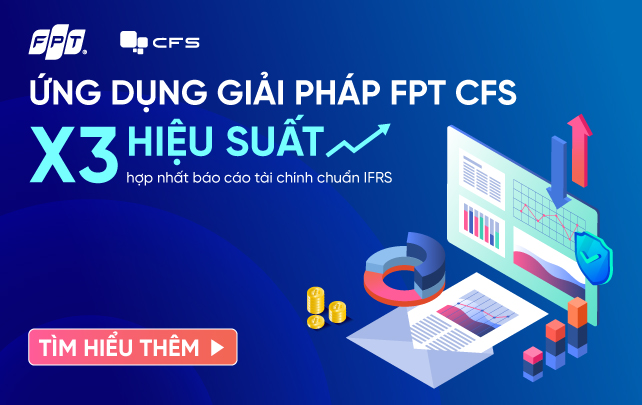The roadmap for applying IFRS in Vietnam is of interest to businesses and accountants. This is a widely applied financial reporting standard, helping businesses create consistent and comparable financial statements globally.
Project to apply international financial reporting in Vietnam
Understanding the shortcomings of VAS, in March 2020, the Ministry of Finance issued Decision No. 345/QD-BTC on Approving the Project to apply financial reporting standards in Vietnam with the main objective of developing plans, roadmaps and announcing and supporting the application of IFRS standards in Vietnam for each specific group of businesses, at the same time issuing new ones and organizing the implementation of the Vietnamese financial reporting standards system (VFRS) on the principle of maximally absorbing international practices and developing standards suitable to the specific conditions of the Vietnamese economy in general and Vietnamese businesses in particular. Accordingly, the application of IFRS in Vietnam will be implemented in a 3-phase roadmap from 2020 to 2025.
Read more: The impact of digital transformation on IFRS conversion

Current status of IFRS application in Vietnamese enterprise
After 4 months of the IFRS application project being approved by the Ministry of Finance, Deloitte Vietnam and HOSE – Ho Chi Minh City Stock Exchange conducted a survey on the readiness to apply IFRS standards in enterprises.
The results showed that more than 50% of enterprises participating in the survey have applied IFRS or are preparing to convert VAS to IFRS. Among enterprises that have not applied or are preparing to apply, more than 55% of enterprises responded that they will convert and apply before 2025. Regarding the form of IFRS application, the survey results showed that up to 70% of enterprises are currently applying IFRS in the form of applying accounting entries converted from VAS to IFRS when preparing and presenting financial statements without applying the form of applying and recording all accounting transactions according to IFRS standards from the beginning.
Transition stages
Phase 1: Preparation period from 2019 – 2021
This is the stage in which the Ministry of Finance will prepare conditions including documents, mechanisms, and human resources including:
- Vietnamese translation of International Financial Reporting Standards (IFRS)
- Guidelines for applying IFRS
- Relevant financial mechanisms
- Implementation process for specific subjects
- Human resource training
Phase 2: Voluntary stage 2022 – 2025
The following enterprises have the need and sufficient resources, notify the Ministry of Finance before voluntarily applying International Accounting Standards (IFRS) to prepare consolidated financial statements:
- Parent companies of large-scale state-owned economic groups or have loans funded by international financial institutions
- Parent companies are listed companies
- Large-scale public companies are unlisted parent companies
- Other parent companies
The Enterprises with 100% foreign direct investment capital, which are subsidiaries of parent companies abroad, have the need and sufficient resources, and notify the Ministry of Finance before voluntarily applying IFRS to prepare separate financial statements. These enterprises must ensure:
- Providing full information
- Clear and transparent explanations to management, supervision and tax authorities
Phase 3: Mandatory phase after 2025
Based on the assessment of the implementation of International Accounting Standards (IFRS) in phase 1, the Ministry of Finance, based on the needs, readiness of enterprises and the actual situation, prescribes the plan and time for mandatory application of IFRS to prepare consolidated financial statements for each group of enterprises belonging to the following specific subjects:
- Parent company of a State-owned economic group
- Parent company is a listed company
- Large-scale public company is an unlisted parent company
- Large-scale parent company other

Things businesses need to note
Benefits of applying International Accounting Standards (IFRS)
Significant improvements in the quality of financial statements (FS) of enterprises not only ensure complete information and better compliance with current standards, but also help build reputation in the market and increase business management efficiency. The transparency and ease of reading of FS also help businesses to be more convenient in international transactions. At the same time, FDI enterprises in Vietnam also reduce the cost of converting FS from VAS to IFRS to merge with parent companies abroad
Cost issue
Costs such as personnel training, upgrading accounting information systems, adjusting accounting policies and databases, as well as editing economic contracts with partners are all important investments to equip for IFRS conversion. These expenses not only help improve the professional qualifications of employees but also increase efficiency and transparency in financial statements, and facilitate development and cooperation with business partners.
Key changes
The transition to IFRS has some notable key changes. The tax base may differ from the tax authority. Terms in economic contracts may have to be adjusted to comply with IFRS. Enterprises need to be ready to comply with the requirements for providing full and detailed information according to IFRS. This requires careful preparation and organization to ensure the transition process is smooth and effective
In the trend of international economic integration and trade liberalization, the application of the IFRS international standards framework is extremely necessary not only for the Vietnamese economy in general, but also for a very large number of Vietnamese enterprises. Therefore, Vietnamese enterprises need to transform strongly to be able to meet the strict requirements of international investors, first of all, to prepare and present financial statements in a standardized manner according to international standards, ensuring fairness, competition and transparency with enterprises in other countries and territories.
Read more: What businesses need to consider when converting to IFRS













